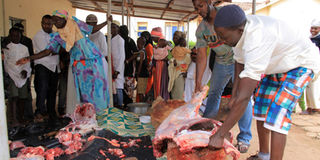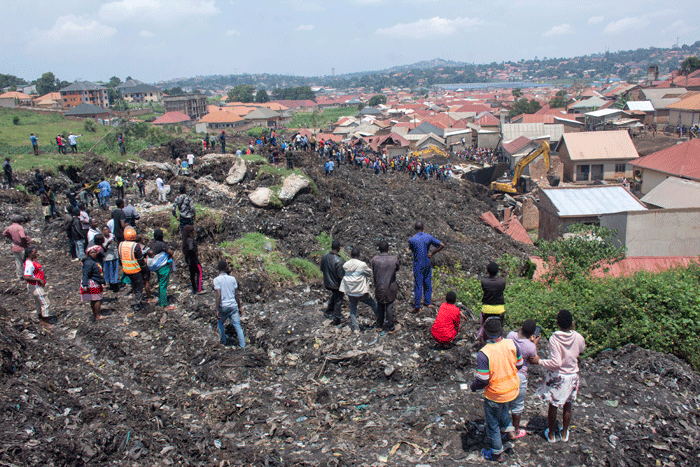Prime
What Eid-ul-Adhuha festivity means in Islam

Festivity. The faithful receive meat at the residence of Hajj Yusuf Allahrakah, in Kansanga, as Muslims worldwide celebrated Eid-ul-Adhuha, last year. PHOTO BY RACHEL MABALA
What you need to know:
Commemoration. Muslims mark Eid-ul-Adhuha to acknowledge the devotion of Prophet Ibrahim, who was willing to sacrifice his son on the order of Allah
Muslims in Uganda today join others worldwide to celebrate the major Islamic holiday of Eid-ul-Adhuha.
Eid-ul-Adhuha, also known as the festival of sacrifice, is marked on the 10th day of Zulhajj, the 12th month on the Islamic calendar.
It coincides with the completion of Hajj, or the pilgrimage to the holy cities of Mecca and Medina, which millions of faithful undertake every year.
Unlike Eid-ul-Fitr which was celebrated in June at the end of Ramadan, Eid-ul-Adhuha is marked by slaughtering of animals as a ritual to commemorate the day Prophet Ibrahim tried to sacrifice his son Ismail to please Allah.
The sacrifice was owing to Prophet Ibrahim’s earlier pledge to Allah that if he was granted a son, at his old age, he would sacrifice him as an offering.
But after several fruitless trials to sacrifice Ismail, Allah sent Prophet Ibrahim a sheep to slaughter in place of his son and commended him for being committed to the earlier pledge, difficult as it was.
Prophet Ibrahim, also known as Abraham, is a prominent figure in Islam, Judaism and Christianity, which demonstrates the common heritage of the three religions.
Significance of Eid-ul-Adhuha
Sheikh Swaibu Ndugga, the Masaka regional district Khadi, says as Muslims mark Eid–ul-Adhuha, they acknowledge the devotion of Prophet Ibrahim, who was willing to sacrifice his son on the order of Allah.
“Today, Muslims do not have to sacrifice their children as Ibrahim had pledged, but animals in place of their children. But because some people lack faith, they simply ignore this important ritual ” he says
Due to its significance, Sheikh Ndugga says Eid-ul-Adhuha festivities last for four days to allow the faithful who did not have money on the first day to slaughter animals during subsequent days.
This means slaughtering of animals will go on till the evening of Wednesday August 14.
He says the animal that is sacrificed has to be goat, sheep, cow or camel and the meat is split into three parts.
“The person who has slaughtered the animal should leave at least one third of the meat to his family and give some to the neighbours and the rest to the poor or vulnerable people in the community,” the Khadi says.
Mandatory
Sheikh Abdul Hamid Kagwa, the Imam of Qubaa-a Mosque, Namagooma, Kyengera Town Council, says it is mandatory for every financially-able Muslim to slaughter an animal for Allah’s sake.
“This special day is not about eating or wearing new clothes, but it is about slaughtering animals and sharing with family and friends. For someone who doesn’t have money, it is understandable, but if one simply refuses to slaughter an animal yet he has money, the Prophet Muhammad (Peace Be Upon Him) advised us to block him from getting near Eid prayer grounds,” he says.
Sheikh Kaggwa castigates working Muslims who usually wait for free meat donated by Muslim non-governmental organisations, saying such meat should be left to only needy people.
“It doesn’t really make sense to see someone who has the means to slaughter an animal queuing for free meat, it is a shame,” he warns.
Hajj Haidari Kizza, a supervisor with Humanitarian Efforts and Relief Uganda (Hear Uganda), one of the organisations that distributes free Eid-ul-Adhuha meat to needy Muslims across the country, says they plan to slaughter at least 1,500 cows and 200 goats this year.
He says priority will be given to Somali refugees in Kisenyi, a city suburb, Yumbe District and other needy communities.
“Like it has been the norm, we shall give meat to the needy and institutions like prisons, police and schools regardless of their religious inclinations,” he says.
How eid-ul-adhuha is celebrated
Traditionally, on Eid day Muslims are expected to bathe and dress in fine white clothes. This is proceeded by a special prayer called Salat al-Idd, which is performed early in the morning at open grounds in honour of the festival. But on the way to the prayer ground, the faithful is expected to recite Allah akbar Allahu akbar laa Ilaaha ill Allahu Allahu akbar (Allah is great, Allah is great, no one is worthy of worship except Allah, Allah is great…).
When one gets to the grounds, he or she just sits and wait for the prayer and later the sermon, to start. All he/she does is to continue saying Allahu akbar Allahu akbar laa Ilaaha ill Allahu Allahu akbar. Eid prayer consists of two prostrations (Rakas) and the first Raka has seven Takbir exclamation (Allah Akbar) while the second Raka has five Takbirs.
The Eid prayer starts immediately after the sun has risen in the morning to about three feet from the horizon. According to a statement issued by Sheikh Yahaya Kakungulu, the director of sharia at Uganda Muslim Supreme Council, the national Eid prayers will start at 9am. The prayers will be led by the Mufti of Uganda, Sheikh Shaban Mubajje, while Sheikh Muhammad Waiswa, the second deputy mufti, will read the sermon (Khutubah). At Kibuli Hill, the seat of the parallel Muslim administration led by Sheikh Silman Kasule Ndirangwa, Eid prayer is expected to be led by Sheikh Lukman Wakinyankali and will start at 9am.
As is the norm, Muslims will later be treated to a sumptuous luncheon at the home of Prince Kassim Nakibinge, the titular head of the Kibuli Muslim community.
In his Eid message, Sheikh Ndirangwa,who is currently in Mecca, urges all preachers of the day nationally to pray for peace and co-existence.
“ Like Allah says in the Holy Koran, He created us as male and female in different nations and tribes so that we know one another . There is really no reason why we should fight each just because we belong to a different tribe, religious denomination or political group,” he says.



